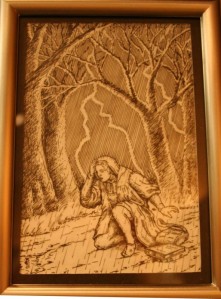Martin Luther and the Fire from Heaven December 29, 2010
Author: Beach Combing | in : Modern , trackbackBeachcombing has looked before at hinge moments – moments where a simple incident changes history; moments which, had they not happened, would have resulted in a quite different world. Beachcombing thought that, in this spirit, he would today visit Mansfeld, Germany 2 July, 1502 where a young student, Martin Luther, is out walking.
Luther’s great fortune or misfortune – depending on your point of view – was that he found himself strolling in a lightning storm and was hurled to the floor by a blast from the sky. The just conscious Luther managed to mumble an oath as he fell: ‘Help, St Anne, I will become a monk!’; that is, if St Anne’s intercession saw him survive then Luther would enter a monastery.
The rest, as they say, is history and fifteen days later our Martin was knocking on the door of the Augustinian Hermits in Erfurt.
Luther became a monk by chance. Without this meteorological stroke it is difficult to imagine a student of law taking a professional interest in faith – beyond that needed for his own salvation. Indeed, if the lightning strike had not come Luther would be today remembered, if he were remembered at all, as a moderately successful sixteenth-century German lawyer.
Instead, he became a bad monk and, as a result, an enemy of the Catholic Church.
Two factors made Luther a bad monk.
First, Luther’s introspection led him to visions and depression as the lightning survivor was constantly brought up against the limits of his own personality and the human condition more generally.
Second, the monastic structure, recognising Luther’s dangerous introspection made the mistake of directing his energy into theology. Papists must still be kicking themselves that Luther was not put to work in the garden. It was as a theologian that Luther would create a world view that would threaten all monasteries.
By 1517 his revolution was unleashed on a world hungry for change and the Reformation had begun – though it was not originally recognised as such. The religious wars in France, the abbot of Glastonbury hung on his own Tor, the sack of Rome and, worst of all, baroque architecture… All would follow from Luther’s close brush with lightning.
Of course, if it had not been Luther it might have been someone else: a Savonarola or a Zwingli or a Huss. But Luther combined in his person several factors that allowed him a success not granted to others. Luther, after all, kept his mercantile respectability and avoided any hint of millenarianism or socialism in his doctrine, making it easier for the aristocracy and rising middle classes to support him. Luther also had the good fortune to be living far from Rome and yet in a part of the world, the Holy Roman Empire, where fissile and divided authority allowed his ‘heresy’ to spread by degrees. Yet, he did not find himself – Zwingli and Calvin’s misfortune – trapped in the Alpine ghetto. Swiss reformation anyone?
Beachcombing has been wondering a lot about lightning in the last few days. Any other cases of lightning intervening in history? drbeachcombing AT yahoo DOT com



